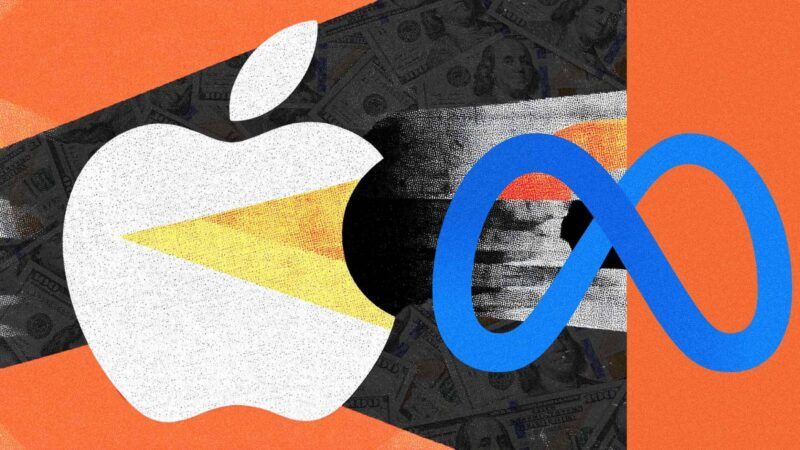European Commission Fines Apple and Meta $800 Million
The penalty amounts to a "multibillion-dollar tariff," a Meta spokesperson says.

The European Commission has fined Apple and Meta 500 million euros ($568 million) and 200 million euros ($227 million), respectively, for violating the Digital Markets Act (DMA). On top of forcing the tech giants to pay steep fines, the commission's proposed remedies would undermine the firms' business models and their ability to serve consumers.
The commission fined Apple on Tuesday for preventing developers from directly informing users of deals offered outside the App Store, thereby depriving consumers of the benefits of "alternative and cheaper offers." The commission has ordered the company to remove these restrictions on pain of additional fines. Apple has called the penalty "yet another example of the European Commission unfairly targeting Apple in a series of decisions that are bad for the privacy and security of our users, bad for products, and force us to give away our technology for free," according to Reuters.
On the same day, Meta was fined for offering Facebook and Instagram users a choice between free versions of the apps with personalized advertising and paid ones without advertising—something the commission calls a "pay or consent model." In a statement, a spokesman for Meta accused the commission of "forcing us to change our business model" said this "effectively imposes a multibillion-dollar tariff on Meta while requiring us to offer an inferior service."
The stated goal of the DMA, which went into effect in November 2022, is to end the "unfair practices by companies that act as gatekeepers in the online platform economy." The DMA defines gatekeepers as those firms that operate "core platform services," including app stores and social networking services.
All of the 23 core platform services except TikTok, a subsidiary of the Chinese company ByteDance, are owned and operated by American tech firms. Alphabet, Amazon, Apple, Booking, Meta, and Microsoft were designated gatekeepers in September 2023 and given until March 2024 to comply with the DMA.
Once a firm is designated as a gatekeeper, it must abide by the DMA's list of "do's" and "don'ts." For example, it must allow businesses to promote offers to customers outside the gatekeeper's platform, and it cannot track users outside of its services for targeted advertising without their express consent. If gatekeeper breaks the rules, the commission can impose fines of up to 10 percent of a company's income from worldwide operations—and 20 percent in the case of repeated infractions. The maximum fines Apple and Meta could have been subjected to, based on their gross revenues in the last fiscal year, were $39 billion and $16 billion, respectively.
Ethan Yang, an antitrust scholar at the American Institute for Economic Research, tells Reason that the DMA "was explicitly written with American tech firms in mind and effectively names 5 out of 7 companies as digital gatekeepers to be singled out for ex ante restrictions on their business models." Yang says the DMA is essentially "a powerful tool for the [European Union] to extract concessions from [those] firms."
Patrick Hedger, director of policy at the trade association NetChoice, agrees with Yang. The law's "vague and arbitrary nature," he says, "leaves them room to find violations when they want to extract fines."
Yang says forcing Apple to inform users of opportunities to spend money elsewhere is the equivalent of a steak house telling diners they could get a better deal if they just bought the meat themselves. In terms of consumer welfare, Yang argues that "Apple is far more willing to invest in and improve its App Store when it can maximize its profits and not have it be turned into essentially a public forum for third parties to advertise to consumers."
As for Meta, the commission concluded that the DMA requires the company to offer users "a service that uses less of their personal data but is otherwise equivalent to the 'personalised ads' service." Hedger argues that by refusing "to accept rational tradeoffs," the European Union is foreclosing the ability to do business on the continent for firms it doesn't like.
"We can only assume that more fines are on the way," says Yang.


Show Comments (49)